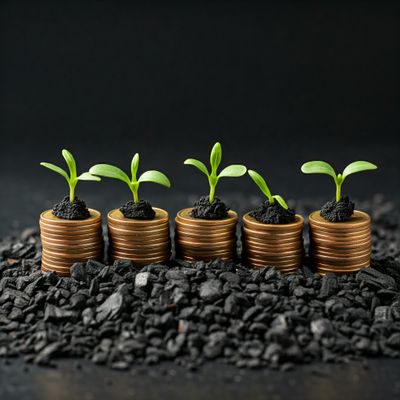

- Home
- Companies
- Beston Group Co., Ltd.
- Articles
- Maximizing Profits with Biochar Machine ...

Maximizing Profits with Biochar Machine Technology
The growing interest in sustainability and resource efficiency has positioned biochar production as a key element in the circular economy. A biochar machine offers an efficient way to convert organic waste into high-value products that benefit both the environment and the economy. The versatility of biochar, combined with the increasing demand for eco-friendly solutions, makes investing in biochar production a profitable venture. By understanding the diverse applications and revenue streams that can be generated from a biochar machine, businesses can unlock significant financial opportunities while contributing to environmental preservation.
Diversified Revenue Streams
One of the most compelling reasons to invest in a biochar machine is the opportunity to create multiple revenue streams. The core product of the pyrolysis process—biochar—has a range of applications across various industries, including agriculture, environmental management, and energy production.
- Agricultural Use: Biochar is highly valued in the agricultural sector due to its ability to enhance soil quality. By improving soil structure, water retention, and nutrient availability, biochar contributes to better crop yields. As a result, biochar can be sold to farmers looking to enhance their soil’s fertility. This makes it a lucrative product, especially in regions with intensive agricultural activity.
- Carbon Credit Generation: The carbon sequestration properties of biochar present another profitable avenue. By locking carbon into the soil, biochar production can contribute to climate mitigation efforts. This creates opportunities for carbon credit trading, where businesses that produce biochar can sell credits to companies seeking to offset their carbon emissions.
- Energy Generation: The pyrolysis process does not only produce biochar; it also generates by-products such as syngas and bio-oil. These can be harnessed to provide renewable energy. Syngas can be used to power the biochar machine itself, reducing operational costs, while excess energy can be sold to the grid, adding another revenue stream.
Cost-Effective Waste Management
A biochar machine offers a sustainable solution to the growing problem of organic waste disposal. Instead of allowing agricultural waste, forestry residues, or even municipal solid waste to accumulate in landfills, businesses can use a biochar machine to convert these materials into valuable products. This waste-to-value process not only reduces landfill use but also mitigates harmful methane emissions associated with landfill decomposition.
For businesses, this translates into lower waste disposal costs and an additional income stream from the sale of biochar and other by-products. In regions where waste management is expensive or regulated, investing in a biochar machine can be a cost-effective alternative, enabling businesses to turn waste into profit rather than burdening the environment.
Soil Remediation and Environmental Benefits
Biochar has significant potential for environmental remediation, particularly in the area of soil health. The porous structure of biochar acts as a filter, removing toxins and heavy metals from polluted soils. This makes it an ideal solution for soil restoration projects, including those aimed at rehabilitating land contaminated by industrial activity or agriculture. By supplying biochar for such applications, businesses can tap into the growing environmental consultancy and land reclamation sectors.
Furthermore, biochar helps in reducing soil erosion and improving water retention, making it especially valuable in areas prone to drought. These benefits extend the reach of biochar applications beyond agriculture, contributing to broader environmental sustainability efforts. As demand for sustainable land management practices grows, biochar presents an opportunity for businesses to capitalize on this expanding market.
Enhancing Product Quality for Niche Markets
In addition to the mainstream applications of biochar, there are niche markets where its specialized properties can add value. For example, biochar can be incorporated into building materials such as concrete, where it improves durability and reduces the environmental impact of cement production. In the water filtration industry, biochar’s adsorption capacity is leveraged to remove impurities from drinking water. By producing high-quality biochar tailored to these specific uses, businesses can command premium prices and serve emerging markets that prioritize sustainability.
Moreover, the demand for premium organic fertilizers is rising, with biochar being a key ingredient in these formulations. Organic farmers and eco-conscious consumers are increasingly willing to pay a premium for fertilizers that contribute to soil health and environmental well-being. This shift presents a profitable opportunity for businesses that can produce high-quality biochar suited for use in these specialized products.
Reduced Operational Costs and Increased Efficiency
Modern biochar machines are designed for efficiency, offering a range of features that reduce operating costs and enhance productivity. Advanced systems are equipped with continuous pyrolysis technology, which allows for a steady supply of biochar with minimal downtime. By optimizing the conversion process, these machines increase yield and reduce energy consumption, making the production process more cost-effective.
Furthermore, many biochar machines are designed to be fully automated, requiring minimal labor input. This automation reduces overhead costs and allows businesses to scale up production with fewer resource requirements. With the ability to generate both biochar and energy from waste materials, the operational efficiency of the biochar machine ensures that businesses can maintain profitability while minimizing environmental impact.
Leveraging Global Sustainability Trends
As global attention shifts toward sustainability and carbon reduction, the market for environmentally friendly products is rapidly expanding. The production of biochar aligns with these trends by offering a solution that contributes to carbon sequestration, soil restoration, and waste reduction. Businesses that invest in biochar production not only benefit from the direct revenue generated by the sale of biochar and its by-products but also position themselves as leaders in the sustainability movement.
Governments around the world are increasingly offering incentives for green technologies, including tax breaks, grants, and subsidies for businesses involved in waste-to-energy and sustainable farming practices. By capitalizing on these opportunities, businesses can further enhance the profitability of their biochar production operations.
Maximizing Profit with Strategic Marketing
The profitability of biochar production also depends on effective marketing strategies. As the demand for eco-friendly products grows, businesses must target the right audience through proper channels. By positioning biochar as a versatile and sustainable solution for various industries, businesses can expand their reach and tap into new markets. Whether through partnerships with agricultural suppliers, environmental consulting firms, or waste management companies, the potential for growth in biochar-related industries is significant.
In conclusion, a biochar machine provides numerous profitable opportunities, from the production of high-value agricultural products to renewable energy generation and waste management. By leveraging the diverse applications of biochar and optimizing the efficiency of the production process, businesses can achieve long-term profitability while contributing to global sustainability goals.
